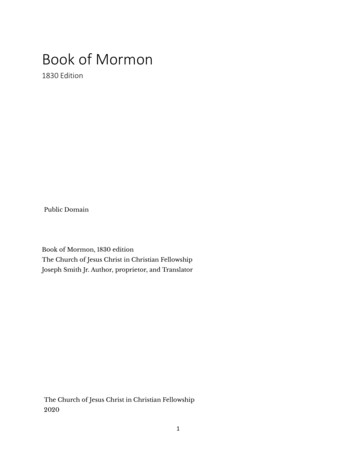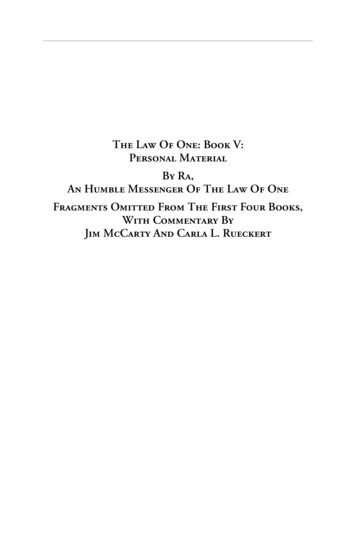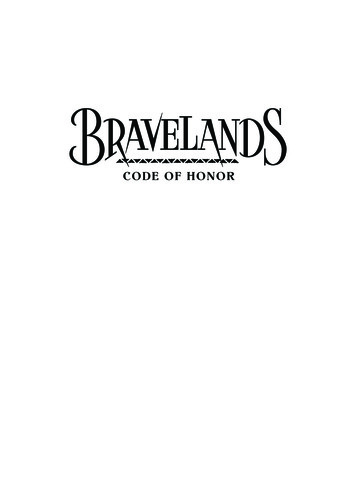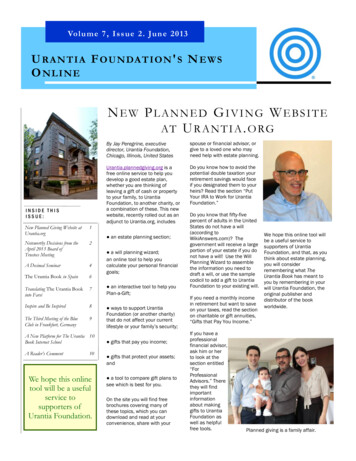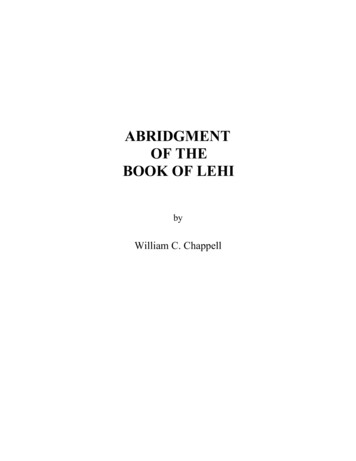
Transcription
ABRIDGMENTOF THEBOOK OF LEHIbyWilliam C. Chappell
2002 by William C. Chappell. All rights reserved.No part of this book may be reproduced, stored in a retrievalsystem, or transmitted by any means, electronic, mechanical,photocopying, recording, or otherwise, without writtenpermission from the author.ISBN: 1-58721-285-4This book is printed on acid free paper.1stBooks - rev. 1/15/02
Abridgment of LehiPART IAN ABRIDGMENTOF THE BOOK OF LEHIPART IIGEOGRAPHY OF THEBOOK OF MORMON1
William C. Chappell2
Abridgment of LehiTable of ContentsAbout the Book. 5An Abridgment of the Record of Lehi. 6Chapter 1: Lehi's youth with the Jews in Egypt. 7Chapter 2: Lehi seeks the will of the Lord. 11Chapter 3: Lehi leaves Egypt for Jerusalem . 15Chapter 4: Lehi leaves the land of Judea . 19Chapter 5: Lehi's people were Israelites in Egypt. 25Chapter 6: Lehi writes by the Spirit of the Lord. 30Chapter 7: Lehi is a prophet and a farmer . 35Chapter 8: Lehi describes the Liahona . 40Chapter 9: The people who fled Jerusalem. 47Chapter 10: Making the books of metal plates . 52Chapter 11: They wandered for eight years. 57Chapter 12: Building the ship of Nephi . 623
William C. Chappell4
Abridgment of LehiAbout the BookPart I of this book gives an abridgment of the record of theprophet Lehi, which was the first book engraved upon the goldplates of the Book of Mormon. The original Book of Lehi, whichwas translated by Joseph Smith in 1828, was stolen and becamelost from the Book of Mormon. Since that time they have simplybeen referred to as the lost 116 manuscript pages.This plain abridgment of the record of Lehi answers severalquestions about the origin of the Book of Mormon. For instance,it explains the connection with Egypt, revealing that Lehi was aJew, or rather an Israelite, from the land of Egypt. It reveals thatLaban's plates of brass were actually Lehi's plates of brass thatwere made by his people in the land of Egypt. As well, it revealsthat the land of their inheritance is simply their house and farm,which was near Hebron in the land of Judea.Since this is from the personal account of the record of Lehi,he describes the nature and function of the Liahona, the makingand composition of the metal plates, and their building the shipof Nephi at Bountiful. Lehi further explains something about thecharacters of their language which were inscribed upon the metalplates. The characters had been developed by his forefathers whowere Israelites living in the land of Egypt, which were unique tothem, and they cannot be proved to the world.Part II of this book describes a simple and realistic model forthe unknown geography of the Book of Mormon. After all theseyears the actual geographic setting for the locations found in theBook of Mormon has not been understood. If the account in thebook is true, then there is a real geography to be found, as well.The author believes that he has discovered a simple and realisticanswer to the question of the Book of Mormon geography.5
William C. ChappellAn Abridgment of the Record of LehiThe record of the prophet Lehi, the son of Samuel, and thefather of Nephi and his brothers; Lehi's youth with the Jews inthe land of Egypt; his vision of the Lord and his prophecies tothe Jews in the city of Jerusalem; his family life on their farm inthe land of Judea; their wandering in the desert of Arabia; thedescription of the brass plates; of the Liahona; their building theship of Nephi; and their sailing across the great sea to the landof promise. Wherefore, this is an abridgment of the record of theprophet Lehi; or, in other words, I, Lehi, wrote this record.6
Abridgment of LehiChapter 1Lehi makes a record and tells of his forefathers in the land ofEgypt. In his youth Lehi seeks for knowledge and the will of God.His kinsmen were coppersmiths and merchants. Lehi leaves hisfamily in Egypt and journeys to Jerusalem. Lehi marries Sariahand his first two sons are born at the house of Laban in the cityof Jerusalem. Lehi names his sons after his forefathers.1:1 Behold I, Lehi, do make a record of my proceedings inmy days. I am the son of Samuel who dwelt all his days in theland of Egypt. And I do inscribe my record on plates of copperand gold alloy, and, behold, I do call it the Record of Lehi.1:2 And, behold, my father Samuel was a coppersmith andmerchant, and he had attained to much riches. And there weremany Jews who did seek after riches and the things of the world.For they were like the Jews who dwelt at Jerusalem; for they didnot seek after the Lord and the riches of his righteousness, butthey did seek after the riches of the world.1:3 Now my forefathers and the Jews that dwelt in Egypt;even though they did not seek to know their God; nevertheless,they did teach their children to believe in God and to keep thecommandments. And my father was a learned man, according toboth the learning of the Jews and the Egyptians.1:4 And I do call my people the Jews in Egypt; but behold,they were Israelites of the tribe of Manasseh who escaped fromnorthern Israel before the war with Assyria. But, behold, most ofIsrael has become lost to the world, and we are all called Jews byother nations. Wherefore, we do also call ourselves Jews.1:5 Wherefore, I, Lehi, was taught the scriptures and thetraditions of the Jews from the days of our fathers. And I, Lehi,did spend much of my time in the pursuit of knowledge and inseeking the will of the Lord my God. Yea, from the days of myyouth I did seek to know my God.7
William C. Chappell1:6 And even as a child these things were of the greatestinterest to me. Yea, I did seek to understand the things of Godwith all my heart. Yea, I did even dream that I might somedaybecome like the great prophet Moses, and that I might do somegreat work for the Lord my God.1:7 Now the learning and the writing of my father, and theother Jews in Egypt, was not according to the Jews at Jerusalem;nor was it according to the Egyptians. For, behold, the Jews inEgypt did develop their own kind of writing. But, nevertheless,they could speak with both the Egyptians and with the people ofother nations. Yea, my people could speak in several languages,for that was useful in the manner of their employment.1:8 Yea, my father and some of the Jews in Egypt did growrich by the manner of their employment. Now some of the Jewsdid barter with the traders among the camel caravans, and theywere good with languages. Others of my people became skillfulin the working of metal, in the smelting of copper, and in thecasting of bronze. And there was also much gold in Egypt. But,behold, the great metal in Egypt was copper.1:9 But, behold, the time came that I, Lehi, did feel that Ishould leave the Jews in the land of Egypt and return to the landof my fathers, even back to the land of Jerusalem. And, surely, itwas from the promptings of the Spirit of God that I did feel that Ishould return back to Jerusalem. For, behold, I was there calledof God to prophesy unto the Jews in the great city of Jerusalem;and of their impending judgment if they did not repent and returnunto the Lord their God. Yea, that was my first calling.1:10 However, let me first write somewhat concerning myfather's family and of my youth among the Jews in the land ofEgypt. And I write this record, praying unto the Lord my God,that this record might someday come forth; that it might bearwitness to the truth; and that the world might know of the tendermercies of our God and of his longsuffering in behalf of Israel.1:11 For God was justified in bringing in those judgmentsupon this people. And the prophets were faithful in doing whatthey could in their attempt to get the Jews in Jerusalem to repent8
Abridgment of Lehiand to return back unto the Lord their God. Wherefore I, Lehi,was one of the prophets whom the Lord sent to testify of thesethings unto the Jews.1:12 And now as I have written, the name of my father wasSamuel, he being named after the prophet Samuel, which was acommon name among my people. And his name means child ofGod in the language of the Jews; for the name Sam means child,and thus did I name my third son.1:13 But, behold, my father did name me Lehi, which wasafter the place where Samson slew the thousand Philistines withthe jawbone of a donkey. For my father, in his searching for aname; and since I had been a small baby; behold, my father didname me Lehi, which means small one or small thing.1:14 For Samson had said, in his bragging, that it was asmall thing for him that he had slain the thousand Philistines.Thus, the place where he slew them was called Lehi. And nowmy father had said, in his blessing and naming of the baby, thatthough you be a small thing, may you be great like Samson.1:15 So when I was eighteen years of age, I did leave myfather and family in the land of Egypt, and I did return unto theland of Jerusalem. I say return, but I mean that I did go back tothe land where my people came from anciently. And this I did bythe promptings of the Spirit, for the Lord had not yet manifestedhimself unto me personally.1:16 Now my father had made arrangements with a certainfamily in the city of Jerusalem from our own tribe of Manasseh;that I might take me a wife, and her name was Sariah. Behold,her name was like unto that of the wife of our father Abraham,which means she of the royal line.1:17 And, behold, Sariah was beautiful like the wife of ourfather Abraham. For the scriptures say that the Egyptians wouldhave slain Abraham to take her to wife. Wherefore, he said thathis wife was his sister, when she was his wife; and, yet, Sarahwas a half sister of Abraham.1:18 And I, Lehi, did dwell in the land of Jerusalem, and inthe land of Judea, for most of my life. That is, I dwelt in the land9
William C. Chappellof Jerusalem since I left the land of Egypt when I was eighteenyears of age. And I did marry Sariah and did take her to wife.And, behold, we dwelt in the city of Jerusalem in the house ofLaban, where our first two sons were born, for about five years.1:19 Behold, my first two sons, who were born in the city ofJerusalem, I did name Laman and Lemuel; and I did name themafter my father's father and his father. And my third son I didname Samuel after the name of my father, but then Laman andLemuel did call him Sam, which means child.1:20 And, behold, my fourth son, Nephi, I did name afterthe name of my mother. For her name was Nepfreteri, which inthe Egyptian language means daughter of the prince, althoughshe was a Jewess. Wherefore, behold, the name Nephi signifiesprince or great leader, which I felt to name him.1:21 And, behold, my last two sons, Jacob and Joseph, whowere born to me in the wilderness of Arabia; behold, I did namethem after our great patriarchs of old; even our father Jacob whocame down into Egypt, and after Joseph who had power in Egyptat the time of the famine.1:22 Yea, I did leave the land of Egypt with their pharaohs,and the pyramids, and their religion of the dead. And the sphinx,even the lioness of Egyptus; which image they made in worshipof Egyptus, the founder of Egypt; yea, a woman named Egyptus,whose son began the reign of the pharaohs.1:23 Yea, behold, I did leave the land of Egypt with theirreligion of the dead; and I did travel up to the land of Jerusalemto find and to serve our God, the God of the living.1:24 And I do inscribe my record upon these plates, whichwere sent unto me from my father in the land of Egypt. And,behold, the servant of my father did also bring me a set of tools,with which we do engrave our records, even tools of hardenedcopper. And the name of the servant was Zoram.10
Abridgment of LehiChapter 2Lehi seeks for the will of the Lord. He prays and the Lordappears unto him as a flame of fire. Lehi sees a vision of God inheaven, and he reads in a book of the coming of a Messiah. Lehiis called to prophesy unto the Jews in the city of Jerusalem.2:1 And, behold, during my days at Jerusalem the Spirit ofthe Lord did begin to work with me. Now as I have said, I didever seek to know the Lord; yea, and I did ever seek for his willconcerning me. And I did seek for revelation and knowledge allthe days of my youth while in the land of Egypt. Yea, I did seekfor the wisdom of the prophets.2:2 And after I returned to Jerusalem, unto the city of theJews, I did all the more earnestly seek to know God and his willconcerning me. Yea, I did go out into the wilderness to fast andto pray unto the Lord my God. For I had felt the promptings ofhis Spirit since the days of my youth; but the Lord had not yetmanifested himself personally unto me. Yea, I did seek to know,and not to believe only.2:3 And, behold, I, Lehi, did on a certain day go out into thewilderness, and I prayed mightily unto the Lord. And I prayednot only for myself, but for all the Jews, and for all the city ofJerusalem. For, behold, they had dwindled in unbelief, and thecity of Jerusalem was full of idolatry and of iniquity. Yea, I didpour out my whole heart and soul unto the Lord my God.2:4 And God did answer me; for, behold, the Lord did comedown in a pillar of light, and he appeared as a flame of fire upona rock before me. Yea, the Lord did appear as fire upon the alter,and the flame of fire was as the size of a man. And, behold, theLord did speak to me in his own voice, and as he spoke I did seethose things in a vision; for his Spirit was upon me, and I felt asif I had been transfigured before him. Yea, and now, behold, Idid know the Lord my God.11
William C. Chappell2:5 And, behold, I did see and hear many things which weregreat and marvelous in my sight. The Lord called me by name,saying that he had called me to be a prophet to prophesy againstthis great city Jerusalem; and that the Jews must repent or beconquered, and many be slain, and the rest carried away captiveby the king of Babylon.2:6 And, behold, I was overcome by the power of God, andI did return unto the house of Laban where I dwelt, and did castmyself down on my bed. And, behold, I was again carried awayin a vision. And I remember that I saw God sitting on his thronein heaven, and he was surrounded by numberless concourses ofangels. Yea, I did behold a glimpse of the glory of God.2:7 And, behold, I, Lehi, did see one as a man descendingout of the midst of heaven, out of the midst of the glory of God.And I beheld that the brightness of his luster was above that ofthe sun at noonday. And I did also see twelve others followingafter him, and their brightness did exceed that of the stars in thefirmament. And they received their glory from him.2:8 And I saw them come down, and they did go forth uponthe face of the earth. And an angel did come and he stood beforeme; and he gave me a book, and he bade me that I read it. And,behold, from the things which I read in the book, it testified ofthe coming of a Messiah; even of the coming of a Savior and ofthe redemption of the world.2:9 And, behold, I did read in the book, saying: Woe, woe,unto Jerusalem, for I have seen thine abominations. And exceptye repent of your idolatries, and your iniquities, and return untome; behold, this great city of Jerusalem shall I destroy. Yea, yeshall perish by the sword, and the rest shall I, the Lord, carryaway captive into Babylon.2:10 Nevertheless, even though I did see and hear all thesegreat and marvelous judgments on my people, the Jews, and thecity of Jerusalem; behold, I was filled with the Spirit of the Lord.Yea, I was filled with praising and glorifying the Lord my God.And I did sing with the angels, saying: Great and marvelous areall thy works, O Lord God Almighty. Thy throne is set high in12
Abridgment of Lehithe heavens, and thy goodness and mercy is shed forth over allthe inhabitants of the earth.2:11 And, behold, there were several prophets whom theLord did send to the city of Jerusalem, to warn the Jews of theirimpending destruction, as a people and a nation, if they did notrepent and return to the law of Moses, and to the prophets, andthe commandments of the Lord their God.2:12 Yea, if they did not forsake all their idolatries; for theJews and all the city of Jerusalem had, for the more part, wentawhoring after the false gods of the pagan nations which wereround about them. And they were committing all manner of sinsand abominations of the heathen nations. Yea, they were doingsuch things which are forbidden of God.2:13 And, behold, the Lord did send several prophets untoJerusalem; saying, that the great city Jerusalem would be carriedoff captive into Babylon; and that their men, and their women,and their children would be slain, and that Jerusalem would beleft desolate, if they did not repent and return unto their God.2:14 And all these judgments would come upon them in thisgeneration if they did not return to Moses and the prophets. Yea,Judah would be given up of the Lord and cast off; even as he haddone performed upon her sister, the northern ten tribes of Israel,that had went awhoring after the gods of the pagan and heathennations and their abominations.2:15 And, behold, the Lord did send the prophets unto thecity of Jerusalem, that he might be justified in bringing in thesejudgments upon them. And there were prophets which did ariseamong the Jews in the land of Judea, and there were prophetswhom the Lord did bring from other lands. And I, Lehi, was oneof them, for, behold, I was brought up out of Egypt.2:16 Wherefore, we were Jews which were the prophets thatdid come from other lands. And the Lord did bring none otherpeople to prophesy against the Jews and Jerusalem, except theywere Jews, or that is, from Israel. For, behold, only the tribes ofJudah, and Benjamin, and the Levites were left at Jerusalem; for13
William C. Chappellthe northern ten tribes of Israel had already been carried off bythe king of Assyria. But, behold, my people did escape.2:17 And, behold, because I did prophesy against the Jews,and against the city of Jerusalem; behold, many of the Jews didcontend against me. And many of the Jews did begin to mockme, and they did revile against me, even to the casting of me outof their city; for I had come out of Egypt, and who was such anone as I to prophesy against them and their city.2:18 But, I, Lehi, did return up unto the city of Jerusalemfrom time to time to prophesy against it; yea, even against theiridolatries, and their false worship, and all the heathen practiceswhich they were committing. Yea, even such things which are anabomination before the Lord our God.2:19 And, behold, the time came, that as I went to prophesyin the city of Jerusalem, that a band of Jews did rush upon me,and they did cast me out of their city. And, behold, they wouldhave stoned me, except by the providence of God I did escapefrom them. Now this was the custom of the Jews that a prophetmust not be stoned to death within the city.2:20 Now I did dwell all my days in the land of Jerusalem,even in the land of Judea; that is, I did dwell there ever since Ileft the land of Egypt, when I eighteen years old and was on myown. For, behold, the land for which a man is known is also theland where he lives, and not the land of his birth only.2:21 And it was in the commencement of the reign of theking Zedekiah, the king of Judah, that I did begin to prophesy tothe Jews; even against all their sins and their abominations, asthe Lord my God had commanded me. But, behold, they wouldnot hearken unto me, nor would they repent.2:22 And, behold, as I have said, there were several otherprophets who did begin to prophesy in Jerusalem in that sameyear. And they like myself were mocked, and reviled, and werecast out of the city. And some of the prophets they did stone.14
Abridgment of LehiChapter 3Lehi's father gives him his inheritance when he leaves forJerusalem. Lehi takes the book of brass plates which containedthe scriptures of the Jews. Lehi marries Sariah who is a niece ofLaban, and he lives in the house of Laban in Jerusalem. Labancasts Lehi and his family out of his house, and Laban keeps theplates of brass which Lehi's fathers had made in Egypt.3:1 But before my going up unto Jerusalem, and since I didintend for this to be a permanent thing, or for my future; behold,my father did insist that I, Lehi, should receive my inheritance.Now I did not ask for it, nor did I seek it. But it was the customof my people, that when a son leaves the family, that he shouldreceive his portion of his inheritance at that time.3:2 Wherefore, my father did give me some of his gold, andsome silver, and other provisions that I should take with me. Butall that I desired was that I might take the record of the Jews withme. Yea, what I most desired was that I might take our book ofscriptures with me up to the great city of Jerusalem.3:3 Now, behold, the scriptures which were had among myfather's family, and the Jews with us in Egypt, were engravenupon plates of brass. Behold, it was a book with pages of brasssheets; and it was a special ore molten of copper, with zinc andtin, and some gold, and bound together with rings.3:4 And I would that they had inscribed our scriptures uponplates of pure gold, so they would have been permanent indeed.But my father, and the Jews in Egypt in their smithing and trade,did consider that their gold should be put to better use than thatof writing, even if it was the word of God. Nevertheless, theyhad the gold which they could have used.3:5 Therefore, I did take the book of our scriptures whichwere engraven upon plates of brass with me to Jerusalem. Nowthe inscriptions were neither Egyptian characters, nor were they15
William C. ChappellHebrew. For, behold, it was a writing of their own making thatmy forefathers had developed. For they lived unto themselves inEgypt; they being separated from both the Jews and Egyptians,except for their work and manner of employment.3:6 For, behold, the engravings upon the plates of brass is atype of characters for shorthand. The characters were developedfrom a combination of different languages, and are like none ofthem in particular. It had begun with their business of trading asa means of secret communication among themselves.3:7 From that it later developed into a written language, thatwe call reformed Egyptian. By that I mean it was a new kind oflanguage which was developed in Egypt; for it was a shorthandused among the Jewish merchants in the land of Egypt.3:8 Now my people who dwelt in the land of Egypt; behold,they did not wish to be known openly among the people. Thus,when they were with Egyptians, they did speak and behave likethe Egyptians. And when they were with Arabians, then they didspeak and behave like the Arabians. But, nevertheless, they hadtheir own characters for their writing. Thus, they did speak thesame as the people, but their inscriptions were secret.3:9 Wherefore, I, Lehi, did go up to the city of Jerusalem,even the great city of the Jews, which I had so often heard aboutfrom my father and his brethren. And now my father did makearrangements that I be given a wife; or rather that I should takeme a wife from among the daughters of a family of the tribe ofManasseh which dwelt at Jerusalem.3:10 And, behold, they did decide upon a maiden from thefamily of Laban, and her name was Sariah. Now even though afamily decided on the marriage of their children; nevertheless, itwas their choice to accept each other or not. The young couplemight not accept each other, but it was expected that they shouldaccept each other, as it was the desire of the family.3:11 Now I did seek an opportunity to see my future wifeSariah; and I knew that surely she did wish to see me too beforeour marriage. And I did see her, and, behold, she was a beautiful16
Abridgment of Lehiand fair maiden, being no more than fourteen years of age, as Isupposed. And Sariah did like me too, as I could tell.3:12 Now the family of my father Samuel, that dwelt in theland of Egypt, and the family of Laban that dwelt at Jerusalem,were kinsmen. Yea, for they are both of the tribe of Manasseh.Thus, my father Samuel and Laban were distantly related. And Idiscovered that Sariah was a niece of Laban, and that she dweltwithin the household of Laban. Wherefore, I also came to dwellwith the household of Laban.3:13 Now it was after the custom of the tribes of Israel thatthey marry among their kindred people. Nevertheless, childrenwho were too kin could not marry. But I and Sariah were onlydistantly related, we both being of the tribe of Manasseh, and ofthe house of our great father Joseph.3:14 Wherefore, I, Lehi, did marry Sariah, and did take herto wife. And we dwelt in Jerusalem until I could buy a house ofmy own. But for the first few years we dwelt with Laban and hisfamily. And at first Laban was like a brother to me; but I foundout later that Laban did only fain affection.3:15 And as I did seek for the mind and will of the Lord;yea, even as I did all the more seek the face of my God, and toobey his commandments; behold, the time came that Laban didcast me out of his house.3:16 And Laban did keep much of my gold and silver whichmy father had given me. For he said that I owed him for my staythose years. But worst of all, Laban did keep my scriptures, eventhe book of the plates of brass that I had brought with me frommy fathers in the land of Egypt.3:17 And, behold, I did try to reason with Laban, even withall of my wit and strength, but it was to no avail. I offered Labanthat he could keep the gold and silver, and only let me have theplates of brass, but he would not.3:18 Yea, Laban did value the book of brass plates, with alltheir strange inscriptions, even above the gold and silver. For hesupposed that they contained some great and secret knowledge17
William C. Chappellfrom the religions of Egypt. But, behold, they did contain onlythe scriptures of the Jews and our genealogy.3:19 Wherefore, I had lost my book of the plates of brass toLaban. For he hid them in his house, and he kept them from me.Therefore, I did leave it in the hands of the Lord as to whether Ishould ever obtain them again.3:20 For, behold, Laban was a rich and a powerful man, andhe was an elder among the Jews. And, behold, he did command agarrison of fifty men who could be called up in defense of thecity. Wherefore, who was I to contend with such a man.18
Abridgment of LehiChapter 4Nephi becomes a great leader. Lehi fears for the salvation ofLaman and Lemuel. They were like twins. Lehi leaves Jerusalemto obey the commandment of the Lord. Lehi is now well strickenin years, and he seeks to finish his record while he is yet amongthe living. Lehi seeks to clarify a few things which may not beunderstood in future generations of the world.4:1 Behold, I do write this record of my life before we shallreach our land of promise. And it is by the leadership of my sonNephi that I shall seek to finish my record. And it is also by thepromptings of the Spirit of God that I do finish it. For I feel thatit is for a wise purpose in the Lord, which purpose I know not ofat this time. Behold, it shall be for future generations.4:2 And, behold, my son Nephi has become a great leader ofthis people, and he has brought us across the wilderness of thedesert of Arabia. And we must cross the great sea unto our landof promise; and I know that Nephi shall become a great prophetin the hands of the Lord our God.4:3 But as for my first two sons, even Laman and Lemuel,behold, I have much reason to fear for their eternal welfare. For,behold, my dreams and my visions by night have much troubledme, and I have oftentimes wet my pillow because of them. Forthe Spirit of the Lord has ceased to strive with them, and I fearlest they shall be cast off forever. And they are my sons.4:4 And I have often thought of them as twins. For, behold,they did act like twins, for they were always together, and theyagreed on every point. Now my son Laman is the eldest, but myson Lemuel was born in about one year later. And they lookedsomewhat alike, and they behaved even more alike; therefore, Ihave often thought of them as twins. But they became the mostdifficult sons unto me, and, behold, I and my faithful son Nephidid have a double portion to contend with.19
William C. Chappell4:5 Nevertheless, as I have said, I did dwell all of my daysat the land of Jerusalem; that is, ever since I was eighteen yearsold, and I did leave the house of my father in the land of Egypt.And, behold, I did dwell in the land of Judea until the Lord didcommand me that I should depart out of the land to find our landof promise. Now all of the land of Judea was called the land ofJerusalem after the name of the great city.4:6 Now it was a hard thing for me that I should leave theland of Jerusalem and go into the wilderness of the desert. For,behold, I am a scholar and a man of the Spirit. For I do delight inthe study of the scriptures, and in receiving inspiration from theSpirit, and revelation from my God. And for me to have to roughit out in the wilderness, and to live in a tent in the desert, was agrievous thing to be borne. Behold, it was not easy.4:7 Nevertheless, I did obey the commandment of the Lord.For, behold, the Lord had commanded me that I should take myfamily; and that we should leave the land of Judea and all of mykinfolk; and that we should sojourn across the wilderness of thedry and barren desert of Arabia.4:8 Therefore, I did gather my family, and we did leave theland of Judea; yea, even as soon as we could, for the Lord didcommand it. And, behold, my wife, and my sons and daughter
Jan 15, 2002 · plates of the Book of Mormon. The original Book of Lehi, which was translated by Joseph Smith in 1828, was stolen and became lost from the Book of Mormon. Since that time they have simply been referred to as the lost 116 manuscript pages. This plain abridgment of the record of Lehi answers several questions

